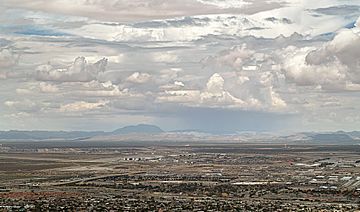Hueco Mountains facts for kids
Quick facts for kids Hueco Mountains |
|
|---|---|

Hueco Mountains in sun and rain, with Cerro Alto prominent, as seen from the base of the tramway, El Paso, Texas, 30 miles (50 km) west of Cerro Alto
|
|
| Highest point | |
| Peak | Cerro Alto Mountain |
| Elevation | 6,703 ft (2,043 m) |
| Dimensions | |
| Length | 71 mi (114 km) N/S |
| Width | 62 mi (100 km) E/W |
| Area | 2,562 sq mi (6,640 km2) |
| Geography | |
| Country | United States |
| State | Texas, New Mexico |
The Hueco Mountains are a mountain range found in the southwestern United States. They start in southern Otero County, New Mexico and stretch about 27 miles (43 km) south into Texas. These mountains are mostly along the border between El Paso and Hudspeth counties in Texas. They are located just east of the city of El Paso, Texas.
The highest point in this mountain range is Cerro Alto Mountain. It stands tall at 6,703 feet (2,043 meters) above sea level. The name Hueco comes from a Spanish word meaning "hollow," "gap," or "hole."
Contents
How the Hueco Mountains Formed
The Hueco Mountains are very old. They were created during a time called the Laramide mountain-building period. This happened about 60 to 70 million years ago, during the late Cretaceous period. During this time, huge forces deep within the Earth pushed the land upwards. This process lifted the mountains to form the range we see today.
The Hueco Bolson: A Neighboring Valley
Next to the Hueco Mountains is an area called the Hueco Bolson. A "bolson" is a basin or valley that has sunk down over time. The Hueco Bolson is about 4,000 feet (1,219 meters) above sea level. It is filled with layers of sand, clay, and other materials. These layers are nearly 9,000 feet (2,743 meters) thick! This deep valley sits between the Hueco Mountains and the Franklin Mountains.
Plants and Wildlife in the Hueco Mountains
The soils in the Hueco Mountains are often shallow and rocky. Despite this, many plants grow there. You can find different types of oak trees and juniper trees. There are also mesquite bushes, which are common in the desert. These plants are adapted to the dry conditions and help support local wildlife.
See also
 In Spanish: Sierra Hueco para niños
In Spanish: Sierra Hueco para niños
 | Misty Copeland |
 | Raven Wilkinson |
 | Debra Austin |
 | Aesha Ash |

